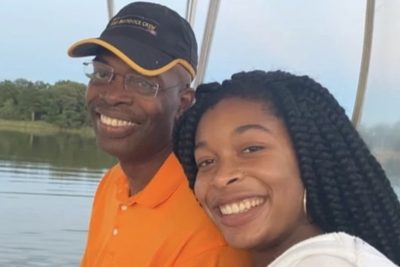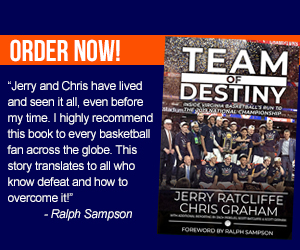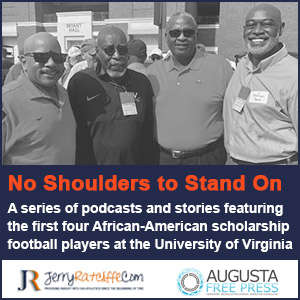UVA teammates remember Kenton Edelin, hero of the Cavaliers’ improbable ride to the ’84 Final Four
By Jerry Ratcliffe
Eighty six seconds remained on the clock in the 1984 Elite Eight when Virginia’s most unlikely hero — one-time walk-on Kenton Edelin — stepped into glory and punched the Cavaliers’ improbable ticket to the NCAA’s Final Four.
Bobby Knight’s Indiana team, fresh off an upset of Michael Jordan-led North Carolina, had just taken a 44-43 lead over UVA, and the Hoosiers were using three guards — Steve Alford, Dan Dakich and Stew Robinson — to milk the clock with their spread offense.
Virginia’s Jimmy Miller, who would go on to become the region’s MVP, was guarding Dakich. Dakich had been the Hoosiers’ hero in the upset of a star-studded Carolina team, shutting down Jordan. This time around, though, Dakich was the unwilling victim.
“Kenton, who was a great defender, just used his instincts and his athletic ability and must have thought to himself, ‘[Dakich] can’t see me,’ and so Kenton came up from behind and tipped the ball out,” Miller remembered this week when recalling the life of Edelin, who died Christmas Eve at the age of 60.
At that precise moment, the game really became interesting for the Cavaliers, who knew the history of the lanky, 6-foot-8 Edelin. Ball-handling was not one of his skills, nor was free-throw shooting, so after Edelin stole the ball, the fun began.
“Kenton had to dribble three quarters of the court, and just to see him do that under those conditions, on that stage and the magnitude of it all, I’ll never forget it,” said Miller. UVA teammate Ricky Stokes, a guard on the team, held his breath as Edelin navigated down the court.
Edelin made it down the floor for a layup and was fouled, which presented another challenge — free throws. As a senior, Edelin was only a 50-percent free-throw shooter, which was a heck of a lot better than his junior season when he made only 30.4 percent of his foul shots (46.3 percent for his career).
“Kenton is the worst (free-throw shooter) I’ve ever coached, except when it counts,” chuckled Virginia coach Terry Holland afterward.
When it counts was the key phrase. The season before, Edelin made two key free throws in UVA’s win over Georgetown in the famous “Game of the Century,” Sampson vs. Ewing showdown.
This time, with a trip to the Final Four at stake, Edelin made the free throw to put Virginia up for good.
The next two times down the floor, Indiana shot and missed, and each time, Edelin was fouled while going for the rebound. Both times, he made the front end of his one-and-one and made three of four free throws as Virginia advanced to the Final Four in Seattle.
The free throws were the most amazing accomplishment of Edelin’s deeds.
Consider just how bad a free-throw shooter he was. He had only been to the line 36 times in 27 games that season. He had a goofy-looking shot and absolutely no range for a jump shot.
In fact, in the postgame, one scribe asked Edelin just what his shooting range was, and Edelin answered, “two inches.” He wasn’t kidding.
“Kenton would stay after practice to work on his free-throw shooting, and some of us volunteered to rebound for him, but none of us wanted to because he would clang them off the rim and we’d have to chase rebounds all over the place … it was a hell of a workout,” Stokes laughed. “We would go up in the stands, and yell, ‘I’ve got this area, Kenton.’”
Good-natured ribbing.
What are the odds that Edelin would steal the ball, score on an open-court dribble, then make three of four free throws to catapult Virginia into the Final Four?
The fiery Knight said of the steal and score: “as big a play as there was. That was absolutely critical for us.”
Edelin’s take on the play: “Dakich turned his back to the basket and my man went to the basket, so I put out my left hand and I was just happy I could dribble down the court without losing it out of bounds.”
Holland joked later, “Edelin really makes all his free throws. We just run those stats to fool people.”
Miller described Edelin as the best 6-8 walk-on in the country, and he was right. Coming out of Hayfield High School in Alexandria, Edelin was a skinny guy, about 170 pounds. His only basketball offers were from Navy, Air Force and Catholic University.
He came to UVA thinking MBA, not NBA. He played intramural pick-up basketball, and some of Virginia’s players recommended that he try out for the team. He played on the Cavaliers’ now-defunct JV team and impressed Holland enough to make varsity.
Because he backed up Sampson, a three-time National Player of the Year, Edelin played in a lot of games against elite competition and became accustomed to never backing down.
“One of the things I always admired about Kenton, other than him being a great teammate, was that life was more important to him than basketball,” Miller remembered. “School and academics meant something to him and basketball was just something he did. If practice started at 3 o’clock, he’d be there at 2:55, lacing them up. If it ended at 5, he was out the door at 5:05, doing what lawyers do.”
Edelin graduated from UVA, was a surprise seventh-round draft choice by the Indiana Pacers, where he played for a year (appearing in 10 games), then returned to Virginia to earn a law degree. He was an attorney in Northern Virginia until his health declined.
Stokes went to visit Edelin at a hospice the Monday before his passing and it was a difficult visit.
“He moved his eyes but did not communicate when I was with him,” Stokes said. “They say hearing is the last thing that goes, so the nurse made me feel better. I was reading prayers that he was listening to.”
Stokes and many of Edelin’s teammates from Virginia visited him over time and kept in contact, offering encouragement and motivation to overcome strokes that had decimated his body, but not his spirit.
Stokes will never forget the first time he noticed Edelin.
“We were going to practice my freshman year and they alerted us that somebody was coming to practice and trying out,” Stokes said. “Here comes this guy, 6-foot-7 and he didn’t have the same uniform as the rest of us, but he competed hard, was a good defensive player and rebounder. The rest is history.”
The fact that he was the hero that sent UVA to the Final Four kind of fit with the funky year the Cavaliers had. It was the year after Sampson and the team struggled to a 17-11 overall record, 6-8 in the ACC. They were crushed in the opening round of the ACC Tournament by Wake Forest and everyone figured they were headed to the NIT.
It had been a strange NCAA Tournament. Miller had lost 15 pounds because of an illness, guard Rick Carlisle ended up playing 32 minutes against Indiana after suffering food poisoning. Guard Othell Wilson fouled out with more than five minutes remaining.
Even Edelin had a rough start to the season. He violently collided with Dan Merrifield in an October scrimmage and suffered a broken orbital bone under his right eye and was out for six weeks.
“He had to wear goggles for a while and we teased him about it,” Stokes chuckled.
What an uncanny story, but a glorious one about a one-time walk-on who played the hero on a Final Four team. It’s a scenario every kid dreams of out in their driveways, allowing their imaginations to run wild.
Stokes and others reminded Edelin of those memories when urging him to fight for his life in the hospital.
“We tried to motivate him and pick him up,” Stokes said. “Being a teammate, you can say things like that.”
Eventually the rah-rah speeches were replaced by scriptures.
“Kenton had a strong faith,” Stokes said. “How could he not.”









